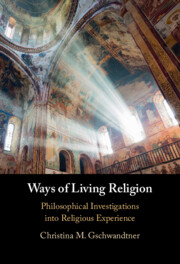Book contents
- Ways of Living Religion
- Ways of Living Religion
- Copyright page
- Dedication
- Contents
- Preface
- Acknowledgments
- Introduction
- 1 Ascetic Experience
- 2 Liturgical Experience
- 3 Monastic Experience
- 4 Mystical Experience
- 5 Devotional Experience
- 6 Compassionate Experience
- 7 Fundamentalist Experience
- Conclusion
- Bibliography
- Index
2 - Liturgical Experience
Published online by Cambridge University Press: 07 March 2024
- Ways of Living Religion
- Ways of Living Religion
- Copyright page
- Dedication
- Contents
- Preface
- Acknowledgments
- Introduction
- 1 Ascetic Experience
- 2 Liturgical Experience
- 3 Monastic Experience
- 4 Mystical Experience
- 5 Devotional Experience
- 6 Compassionate Experience
- 7 Fundamentalist Experience
- Conclusion
- Bibliography
- Index
Summary
This chapter treats liturgical experience. It finds that there are few textual sources for the study of this experience and that instead practices, postures, gestures, and other elements of lived ritual experience must be considered. Liturgical experience is characterized by structures of repetition and predictability that enable participants to integrate their own experiences and to feel that they belong to something that has preceded them, thus providing a sense of stability and meaningful identity. Liturgy features cycles of confession and celebration that in their back-and-forth movements allow people to process their emotions and to participate in bodily practices that express their convictions and deepest concerns. Liturgical participants are thus shaped in their identity within communities of belonging that provide meaning to their daily experience, both regular and extraordinary.
Keywords
- Type
- Chapter
- Information
- Ways of Living ReligionPhilosophical Investigations into Religious Experience, pp. 56 - 89Publisher: Cambridge University PressPrint publication year: 2024

